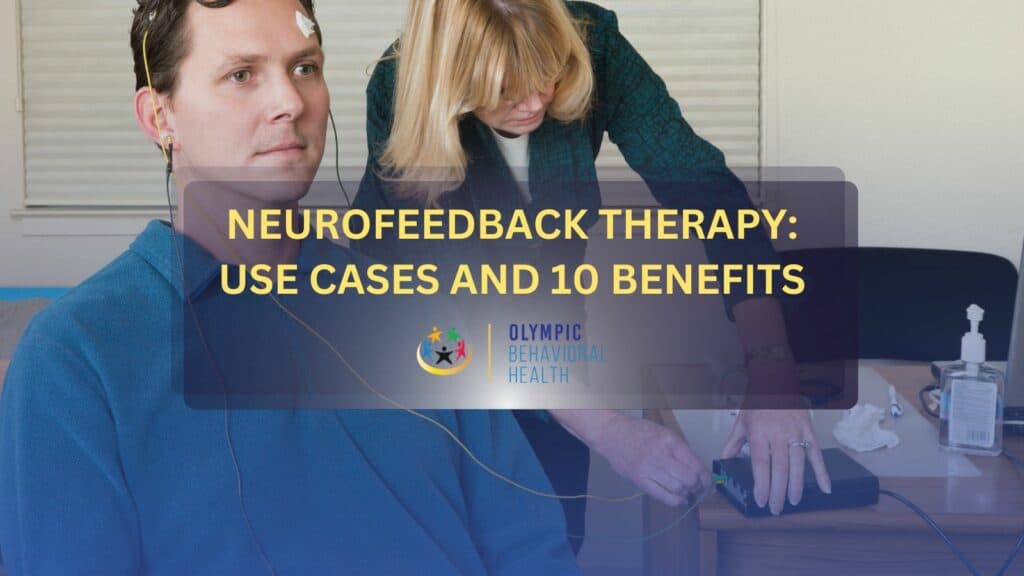Neurofeedback therapy often emerges as the underrecognized ally in the realm of addiction treatment, standing in the shadow of more traditional therapeutic approaches.
Yet, it carves its niche with unparalleled precision and adaptability in addressing the neurological underpinnings of addiction. This distinctive approach sets it apart in the extensive field of addiction therapies, offering a unique experience that establishes neurofeedback therapy as a category of its own within the recovery landscape.
Key benefits of neurofeedback therapy for addiction include its ability to reduce cravings, enhance emotional regulation, boost cognitive functions, and increase self-awareness of triggers and responses. Each benefit is known for its distinct impact on the recovery process. Additionally, neurofeedback therapy stands out by promoting effective stress management techniques, fostering restorative sleep patterns, empowering individuals with a sense of control, and improving concentration and attention—all crucial for a successful recovery journey.
Delving deeper, each advantage of neurofeedback therapy presents its own set of mechanisms, scientific backing, practical applications, and recommendations for integration into treatment programs. The following sections will explore these facets in detail, providing a comprehensive understanding of how neurofeedback therapy offers a potent tool in the fight against addiction, making it a cherished methodology in treatment centers worldwide.
What is neurofeedback therapy?
Neurofeedback therapy is a cutting-edge, non-invasive technique that trains the brain to function more efficiently. By measuring and displaying brainwave activity in real-time, this therapy allows individuals to gain direct feedback on their neurological functioning.
The essence of neurofeedback lies in its ability to encourage positive brain activity through feedback, leveraging the brain’s natural plasticity.
As individuals learn to modulate their brainwaves, they can address the neurological aspects of addiction, paving the way for improved emotional regulation, decision-making, and impulse control. This innovative approach offers a promising avenue for those seeking to overcome addiction, providing a foundation for healthier cognitive patterns and behaviors.
How does Neurofeedback Therapy work?
Neurofeedback therapy works for addiction by measuring and displaying brainwave activity, allowing individuals to see their brain’s functioning in real time. This visibility empowers them to recognize and modify patterns associated with addiction.
The therapy encourages positive brain activity through feedback, utilizing sounds, images, or video games as rewards for desired brainwave patterns.
This process taps into the brain’s adaptability, guiding it towards healthier states that reduce cravings and improve emotional regulation. Over time, neurofeedback helps individuals develop better cognitive functions and stress management techniques, key components in maintaining sobriety and enhancing overall well-being.
Measures and displays brainwave activity
Neurofeedback therapy begins by accurately measuring brainwave activity through sensors placed on the scalp. This process captures the electrical patterns that the brain emits during different states of mind.
The therapy then displays this activity in a way that can be understood in real-time, providing a clear picture of one’s neurological state.
This measurement is crucial, as it lays the groundwork for personalized therapy, targeting the specific brainwave patterns that need adjustment in the context of addiction recovery.
Encourages positive brain activity through feedback
Following the measurement of brainwaves, neurofeedback therapy encourages the cultivation of positive brain activity. It does this by providing immediate feedback—often in the form of visual or auditory signals—when the brain engages in desirable patterns.
This feedback acts as a reward system, reinforcing healthy brain activity and gradually training the brain to default to these beneficial patterns.
Over time, this method helps individuals gain control over their brain functions, directly addressing the neurological aspects of addiction and fostering a path towards recovery.

Benefits of neurofeedback in Addiction Treatment?
Neurofeedback therapy offers a multitude of benefits for individuals battling addiction, each playing a pivotal role in the journey to recovery. It reduces cravings for substances by directly influencing the brain’s reward system, helping to lessen the allure of addictive behaviors.
It enhances emotional regulation, crucial for managing the impulsivity often linked with addiction.
By boosting cognitive functions, individuals are better equipped for making healthier decisions, a key factor in sustaining long-term recovery.
The therapy increases self-awareness of triggers and responses, empowering individuals to recognize and avoid potential relapse situations. Additionally, neurofeedback supports effective stress management techniques and promotes restorative sleep patterns, both essential for maintaining mental and physical health during recovery.
It fosters a sense of control over one’s own mind, which is immensely empowering for individuals in treatment. Lastly, by improving concentration and attention, neurofeedback aids in the overall therapy process, making it easier for individuals to engage with and benefit from other treatment modalities.
- Reduces cravings for substances
Neurofeedback therapy directly targets the brain’s reward system, effectively reducing cravings for addictive substances. This benefit is crucial for breaking the cycle of addiction and facilitating a smoother recovery process.
- Enhances emotional regulation, reducing impulsivity
By improving emotional regulation, neurofeedback therapy helps to reduce impulsivity, a common challenge for individuals struggling with addiction. Enhanced control over emotions contributes to better decision-making and reduces the likelihood of relapse.
- Boosts cognitive functions for better decision-making
The therapy boosts cognitive functions, including memory, attention, and executive functions, which are essential for making informed decisions. Improved cognitive abilities support a more proactive and thoughtful approach to recovery and life choices.
- Increases self-awareness of triggers and responses
Neurofeedback therapy enhances self-awareness, enabling individuals to recognize and understand their triggers and responses. This increased awareness is a powerful tool in managing addictive behaviors and preventing relapse.
- Supports effective stress management techniques
By promoting techniques for effective stress management, neurofeedback therapy aids individuals in handling stress without resorting to substance use. Managing stress effectively is key to maintaining balance and supporting long-term recovery.
- Promotes restorative sleep patterns, essential for recovery
Restorative sleep patterns are promoted through neurofeedback therapy, addressing one of the common challenges in addiction recovery. Quality sleep is vital for physical and mental health, aiding in the healing process.
- Fosters a sense of control, empowering the individual
Neurofeedback therapy fosters a sense of control over one’s own mind and body, empowering individuals in their recovery journey. This sense of autonomy is crucial for building confidence and resilience.
- Improves concentration and attention, aiding in therapy
Finally, the therapy improves concentration and attention, which are vital for engaging effectively in therapy and other recovery activities. Enhanced focus supports learning and application of new coping strategies.

Use cases in addiction treatment
Neurofeedback therapy has been effectively applied across a spectrum of addiction cases, demonstrating its versatility and efficacy in treating various forms of dependency. It has shown significant results in reducing alcohol dependency, offering a non-invasive alternative to traditional treatments.
For those battling drug abuse, including prescription medications, neurofeedback provides a pathway to recovery by addressing the neurological patterns associated with addiction.
The therapy is also beneficial for individuals looking to quit smoking, as it reduces cravings and supports the cessation process. Beyond substance abuse, neurofeedback aids in treating behavioral addictions such as gambling, by helping to manage urges and compulsive behaviors.
Additionally, it offers support for overcoming food addiction, targeting emotional eating and helping individuals establish healthier eating patterns.
Through these diverse applications, neurofeedback therapy emerges as a comprehensive tool in the addiction treatment landscape, adaptable to a wide range of needs and recovery goals.
Effective for alcohol dependency reduction
Neurofeedback therapy has proven effective in reducing alcohol dependency, helping individuals regain control over their drinking habits by rebalancing the brain’s reward system and reducing cravings.
Aids in recovery from drug abuse, including prescription drugs
This therapy aids in the recovery from drug abuse, including misuse of prescription drugs, by addressing the underlying neurological patterns that contribute to addiction, fostering healthier brain function.
Supports cessation of smoking through craving reduction
Neurofeedback therapy supports the cessation of smoking by significantly reducing cravings, making it easier for individuals to quit smoking and avoid relapse.
Helps manage urges in gambling addiction
For those struggling with gambling addiction, neurofeedback therapy helps manage urges by enhancing self-control and emotional regulation, directly addressing the impulsivity that fuels gambling behavior.
Assists in overcoming food addiction by regulating emotional eating
Lastly, neurofeedback therapy assists in overcoming food addiction by helping to regulate emotional eating patterns, promoting healthier eating habits, and addressing the emotional triggers of overeating.
Integration into treatment programs
Neurofeedback therapy can seamlessly integrate into existing addiction treatment programs, enhancing their effectiveness and providing a more holistic approach to recovery.
It can serve as a primary treatment method, directly targeting the neurological aspects of addiction, or it can complement other therapies, such as cognitive-behavioral therapy (CBT), medication-assisted treatment (MAT), and counseling, offering a multi-faceted approach to addiction recovery.
This flexibility allows for tailored treatment plans that address both the psychological and neurological components of addiction, ensuring a comprehensive recovery process.
The integration of neurofeedback into treatment programs underscores the importance of a personalized approach, recognizing that recovery is a unique journey for each individual.
Can be used as a primary treatment method
Neurofeedback therapy stands out as a primary treatment method for addiction, focusing directly on the brain’s role in substance dependence and behavioral addictions.
Its ability to retrain brainwave patterns offers a foundational approach to recovery, addressing the neurological underpinnings of addiction head-on.
Complements other therapies for holistic recovery
In addition to its efficacy as a standalone treatment, neurofeedback therapy complements other therapies to facilitate a holistic recovery.
By integrating with approaches like cognitive-behavioral therapy (CBT), medication-assisted treatment (MAT), and various counseling methods, it enhances the overall treatment efficacy, ensuring a well-rounded approach to addiction recovery.
Considerations before starting
Before embarking on neurofeedback therapy for addiction, several key considerations must be taken into account to ensure the treatment’s success and appropriateness for the individual. Commitment level to the recovery process is paramount, as neurofeedback requires consistency and active participation.
Understanding the financial and time investment involved is also crucial, as therapy can be an extensive process requiring multiple sessions.
Lastly, selecting a certified neurofeedback therapist is essential to receive quality care tailored to the individual’s specific needs. These considerations lay the groundwork for a successful therapy experience, helping individuals and their support networks make informed decisions about incorporating neurofeedback into their recovery journey.
Commitment level to the recovery process
A strong commitment to the recovery process is critical when considering neurofeedback therapy. This commitment reflects an individual’s readiness to engage actively with the therapy sessions and adhere to the treatment plan, which is vital for achieving meaningful outcomes.
Financial and time investment understanding
Understanding the financial and time investment required for neurofeedback therapy is essential. Prospective participants should be aware that therapy involves a series of sessions over a period, necessitating both a time commitment and financial planning to support the full course of treatment.
Selection of a certified neurofeedback therapist
Choosing a certified neurofeedback therapist is paramount. Certification ensures that the therapist has the required training, skills, and experience to provide effective treatment. Working with a certified professional helps maximize the benefits of neurofeedback therapy and ensures a safe and supportive environment for recovery.
Potential limitations and challenges
While neurofeedback therapy offers promising benefits for addiction treatment, it’s important to acknowledge its potential limitations and challenges. Individual responses to therapy can vary, highlighting the absence of a one-size-fits-all treatment protocol.
This variability means that while some individuals may experience significant improvements, others might find the therapy less effective.
Additionally, the ongoing research to optimize efficacy and outcomes indicates that the field is still evolving, with new findings potentially altering current practices. Understanding these limitations and challenges is crucial for setting realistic expectations and making informed decisions about incorporating neurofeedback therapy into a comprehensive addiction treatment plan.
Individual responses to therapy may vary
Individual responses to neurofeedback therapy may vary, a reality that underscores the complexity of addiction treatment. This variation in effectiveness highlights the importance of personalized treatment plans that can be adjusted to meet each person’s unique needs and responses.
Absence of a one-size-fits-all treatment protocol
The absence of a one-size-fits-all treatment protocol in neurofeedback therapy reflects the diverse nature of addiction and the individuals it affects. Tailoring the therapy to each person’s specific brainwave patterns and addiction challenges is crucial for achieving the best outcomes.
Ongoing research to optimize efficacy and outcomes
Ongoing research is vital to the field of neurofeedback therapy, with efforts continuously underway to optimize efficacy and outcomes. This research is key to refining treatment methods, improving success rates, and expanding the understanding of how neurofeedback can be most effectively used in addiction treatment.
Get Neurofeedback Therapy
Neurofeedback therapy is a non-invasive, drug-free treatment that uses electronic sensors to monitor and train brain activity. It has been used to treat a wide range of conditions, including ADHD, anxiety, and PTSD.
If you are interested in trying neurofeedback therapy in West Palm Beach, South Florida, feel free to reach out to us.

Share This Post



